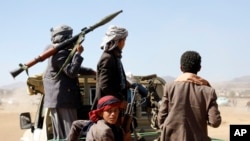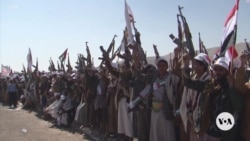The United States is cracking down on Yemen’s Houthi rebels, redesignating them as a Specially Designated Global Terrorist group following weeks of missile and drone attacks on international shipping in the Red Sea and Gulf of Aden.
The move came nearly three years after the Houthis were first designated as a terror group and then subsequently delisted because of humanitarian concerns, and it followed repeated demands from the U.S. and other countries for the Houthis to stop firing on commercial shipping.
But the demands have been ignored, and attacks have continued despite a series of airstrikes by the U.S. and Britain, aimed at taking out radar systems and launch sites used in the attacks.
“We cannot sit idly by and watch what the Houthis are doing in the Red Sea and not recognize their actions for what they are,” a senior U.S. administration official told reporters, briefing the condition of anonymity ahead of the official announcement.
“These attacks fit the textbook definition of terrorism,” a second official said, likewise speaking on the condition of anonymity. “They have endangered U.S. personnel, civilian mariners and our partners, jeopardized global trade and threatened freedom of navigation.”
U.S. officials point to about 30 attacks from Houthi-controlled areas of Yemen since mid-November, impacting citizens, cargo and vessels from more than 50 countries.
Officials have also said that since the attacks started, some 2,000 ships have been diverted thousands of miles to avoid the Red Sea. Additionally, Houthi militants have threatened or taken hostage mariners from more than 20 countries.
On Tuesday, the U.S. for the first time carried out a series of preemptive strikes, destroying four Houthi anti-ship ballistic missiles before they could be launched.
That followed two waves of U.S. and British strikes last week against more than 60 targets in 16 locations across Houthi-controlled Yemen.
Houthi officials Wednesday described the U.S. designation as an attempt at “blackmail.”
“Whoever fails with aggression will certainly fail with a decision [of designation],” Houthi media official Abdul-Rahman Al-Ahnumi said in an interview with Reuters.
"The decision came at this time after Britain and America launched a military aggression against Yemen and failed to achieve the same goal, which is to dissuade Yemen from its position,” Al-Ahnumi said. “It is also an attempt to dissuade Yemen from its position supporting Palestine and Gaza.”
But in separate statements Wednesday, White House national security adviser Jake Sullivan and Secretary of State Antony Blinken called the Houthi attacks “unprecedented.”
“This designation is an important tool to impede terrorist funding to the Houthis, further restrict their access to financial markets,” Sullivan said.
“The Houthis must be held accountable for their actions,” Blinken said.
Several U.S. officials, though, left open the possibility the designation could be revoked if the attacks cease.
“The ultimate goal of sanctions is to convince the Houthis to de-escalate and bring about a positive change in behavior,” one of the senior administration officials who briefed on the condition of anonymity told reporters. “If the Houthis cease their attacks, we can consider delisting designation.”
But the official added the U.S. is taking steps to ensure that the designation does not harm efforts to help Yemen’s civilian population, where the United Nations estimates 24 million people are at risk of starvation.
The re-designation of the Houthis as a Specially Designated Global Terrorist group will not go into effect for 30 days, “to allow us to ensure robust humanitarian carve-outs are in place,” the official said.
The official also said commercial shipments to Yemen of for food, medicine and fuel would not be affected by the sanctions.
The designation, however, will block the ability of the Houthis to access the U.S. financial system and paves the way for other sanctions and law enforcement actions against the group.
U.S. officials said the ability to ensure to continuation of humanitarian aid played a role in the decision to label the Houthis with the SDGT designation.
They said designating the Houthis with the harsher Foreign Terrorist Organization, or FTO, label would require additional sanctions that could ensnare aid organizations trying to provide relief for Yemen’s civilians.
“We found in our conversations with groups that are providing humanitarian aid in Yemen that an FTO designation ran the risk of having a deterrent effect on some of those aid groups continuing to provide aid, worried that they might be charged as providing material support to a terrorist organization,” State Department spokesperson Matthew Miller told reporters during a briefing on Wednesday.
“So, when weighing those options, we decided that the SDGT designation gave us the tools to deny the Houthis access to the financial system, and gave us the tools to impose additional actions, additional sanctions, on anyone who does business with the Houthis, while minimizing some of the downstream harm to Yemeni civilians,” he said.
Some aid groups, though, have already raised concerns that the SDGT designation will hurt more than it helps.
“Even with carve-outs, there is likely to be a serious chilling effect,” the International Rescue Committee’s Anastasia Moran said in a statement. “We are concerned some private sector actors, including food importers and banks facilitating transactions for humanitarian organizations, may choose to disengage altogether.”
In contrast, some U.S. lawmakers are warning the SDGT designation does not go far enough.
“Designating the Houthis as a Specially Designated Global Terrorist only applies sanctions and avoids taking any real action,” House Intelligence Committee Chairman Mike Turner said in a statement. “It’s time to lead and protect and call them what they are — a Foreign Terrorist Organization.”
Elisabeth Kendall, a Yemen specialist at the University of Cambridge in Britain, cautioned that regardless of the type of terrorist designation, the impact on the Houthis was likely to be minimal.
“Houthi hardliners and leaders will see this as a badge of honor and continue business as usual,” she told VOA via email.
“They will not be the ones to suffer,” she added. “The war economy is booming and has enriched many powerful figures. The smuggling trade may even prove more lucrative following the designation.”
There are also questions about how the new designation will affect countries like Iran that have been supplying the Houthis.
“They [Houthis] currently use IRGC [Islamic Revolutionary Guard Corps] funding, training and weapons to destabilize Yemen and engage in terrorist activities or terrorism that affects the region,” said a third senior administration official in response to a question from VOA.
“So, we will continue to also counter Iranian malign influence wherever we can,” the official said. “Of course, the choice to move away from Iran is now in the hands of the Houthis."
The U.S. first designated the Houthis, also known as Ansarallah, as both an SDGT and a FTO during the last days of President Donald Trump’s administration in January 2021.
According to a statement by then-Secretary of State Mike Pompeo, the move was intended “to hold Ansarallah accountable for its terrorist acts, including cross-border attacks threatening civilian populations, infrastructure and commercial shipping.”
But the designation was revoked about a month later under current U.S. President Joe Biden, with officials citing the need to get humanitarian aid into Yemen to prevent a possible famine.
“This decision is a recognition of the dire humanitarian situation in Yemen,” Secretary of State Antony Blinken said at the time. “By focusing on alleviating the humanitarian situation in Yemen, we hope the Yemeni parties can also focus on engaging in dialogue.”
The White House on Wednesday defended its decision to remove the terror designation for the Houthis, despite the need to redesignate them now.
“A big reason why we delisted them literally on day one was to address a dire, dire humanitarian situation on the ground," National Security Council spokesman John Kirby told reporters.
The Pentagon on Wednesday said the decision to designate the Houthis would not affect military operations in the region.
White House Bureau Chief Patsy Widakuswara contributed to this report. Some information came from Reuters and The Associated Press.







